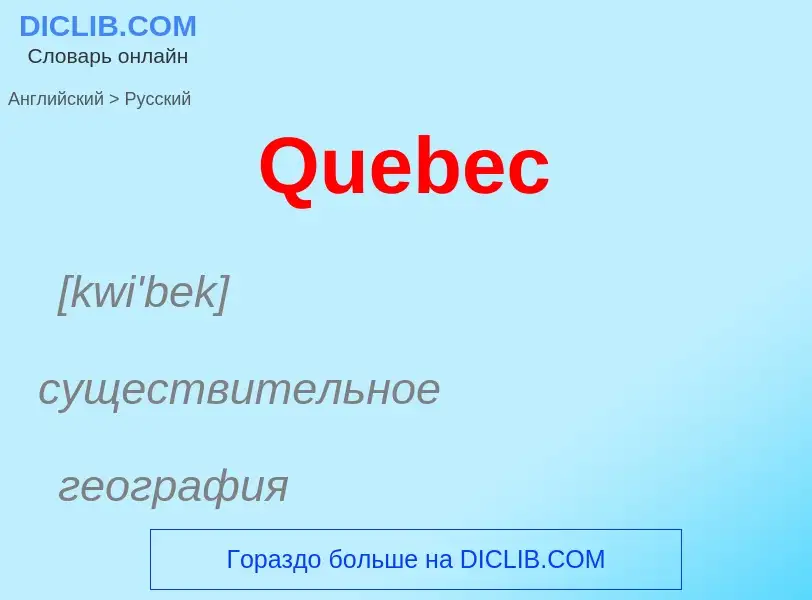Übersetzung und Analyse von Wörtern durch künstliche Intelligenz ChatGPT
Auf dieser Seite erhalten Sie eine detaillierte Analyse eines Wortes oder einer Phrase mithilfe der besten heute verfügbaren Technologie der künstlichen Intelligenz:
- wie das Wort verwendet wird
- Häufigkeit der Nutzung
- es wird häufiger in mündlicher oder schriftlicher Rede verwendet
- Wortübersetzungsoptionen
- Anwendungsbeispiele (mehrere Phrasen mit Übersetzung)
- Etymologie
Quebec - Übersetzung nach russisch
[kwi'bek]
существительное
география
Квебек (провинция Канады)
г. Квебек
[ʃə'vinigən'fɔ:lz]
география
г. Шавиниган-Фолс
Definition
Wikipedia
Quebec ( k(w)ih-BEK; French: Québec [kebɛk] (listen)) is one of the thirteen provinces and territories of Canada. It is the largest province by area and the second-largest by population. Much of the population of Quebec lives in urban areas along the St. Lawrence River, between its most populous city, Montreal, and the provincial capital, Quebec City. The province is the home of the Québécois nation. Located in Central Canada, the province shares land borders with Ontario to the west, Newfoundland and Labrador to the northeast, New Brunswick to the southeast, and a coastal border with Nunavut; in the south it borders Maine, New Hampshire, Vermont, and New York in the United States.
Between 1534 and 1763, Quebec was called Canada and was the most developed colony in New France. Following the Seven Years' War, Quebec became a British colony: first as the Province of Quebec (1763–1791), then Lower Canada (1791–1841), and lastly Canada East (1841–1867), as a result of the Lower Canada Rebellion. It was confederated with Ontario, Nova Scotia, and New Brunswick in 1867, beginning the Dominion of Canada. Until the early 1960s, the Catholic Church played a large role in the social and cultural institutions in Quebec. However, the Quiet Revolution of the 1960s to 1980s increased the role of the Government of Quebec in l'État québécois (the state of Quebec).
The Government of Quebec functions within the context of a Westminster system and is both a liberal democracy and a constitutional monarchy. The Premier of Quebec, presently François Legault, acts as head of government. Québécois political culture mostly differs on a nationalist-vs-federalist continuum, rather than a left-vs-right continuum. Independence debates have played a large role in politics. Quebec society's cohesion and specificity is based on three of its unique statutory documents: the Quebec Charter of Human Rights and Freedoms, the Charter of the French Language, and the Civil Code of Quebec. Furthermore, unlike elsewhere in Canada, law in Quebec is mixed: private law is exercised under a civil-law system, while public law is exercised under a common-law system.
Quebec's official language is French; Québécois French is the regional variety. The economy of Quebec is mainly supported by its large service sector and varied industrial sector. For exports, it leans on the key industries of aeronautics, hydroelectricity, mining, pharmaceuticals, aluminum, wood, and paper. Quebec is well known for producing maple syrup, for its comedy, and for making hockey one of the most popular sports in Canada. It is also renowned for its culture; the province produces literature, music, films, TV shows, festivals, folklore, and more.

![[[Baie-Saint-Paul]] during winter [[Baie-Saint-Paul]] during winter](https://commons.wikimedia.org/wiki/Special:FilePath/Baie-Saint-Paul.jpg?width=200)

![[[George-Étienne Cartier]], co-premier from [[Canada East]] and a Father of Confederation [[George-Étienne Cartier]], co-premier from [[Canada East]] and a Father of Confederation](https://commons.wikimedia.org/wiki/Special:FilePath/George-Etienne Cartier.jpg?width=200)

![[[Grande Noirceur]]}} [[Grande Noirceur]]}}](https://commons.wikimedia.org/wiki/Special:FilePath/Maurice Duplessis.jpg?width=200)
![[[René Lévesque]], one of the architects of the Quiet Revolution, and the Premier of Quebec's first modern sovereignist government [[René Lévesque]], one of the architects of the Quiet Revolution, and the Premier of Quebec's first modern sovereignist government](https://commons.wikimedia.org/wiki/Special:FilePath/René Lévesque BAnQ P243S1D865.jpg?width=200)
![The [[Battle of Saint-Eustache]] was the final battle of the Lower Canada Rebellion.<ref name=rebellion/> The [[Battle of Saint-Eustache]] was the final battle of the Lower Canada Rebellion.<ref name=rebellion/>](https://commons.wikimedia.org/wiki/Special:FilePath/Saint-Eustache-Patriotes.jpg?width=200)
![Province of Quebec]] from 1763 to 1783. Province of Quebec]] from 1763 to 1783.](https://commons.wikimedia.org/wiki/Special:FilePath/Province of Quebec 1763, 1774, 1784.gif?width=200)
![[[Lower Canada]] from 1791 to 1841. ([[Patriots' War]] in 1837, [[Canada East]] in 1841) [[Lower Canada]] from 1791 to 1841. ([[Patriots' War]] in 1837, [[Canada East]] in 1841)](https://commons.wikimedia.org/wiki/Special:FilePath/Évolution territoriale du Bas-Canada.gif?width=200)

![[[St-Jean-Baptiste Day]] celebrations at Maisonneuve park in Montréal [[St-Jean-Baptiste Day]] celebrations at Maisonneuve park in Montréal](https://commons.wikimedia.org/wiki/Special:FilePath/St-Jean!042.jpg?width=200)
![Fleurdelisé]] flying at [[Place d'Armes]] in Montreal Fleurdelisé]] flying at [[Place d'Armes]] in Montreal](https://commons.wikimedia.org/wiki/Special:FilePath/Flag-of-Quebec.jpg?width=200)


